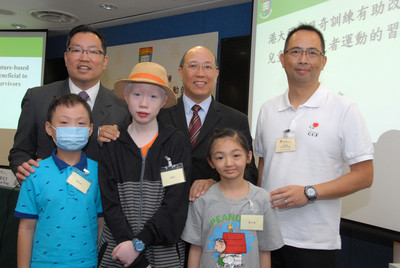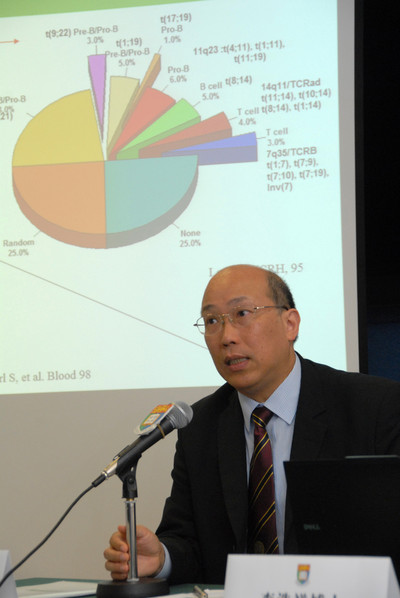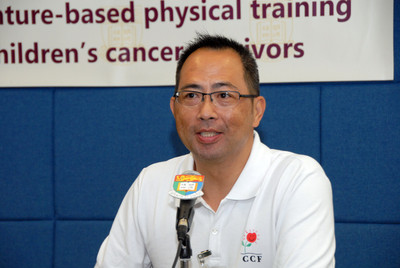HKU finds that adventure-based physical training is beneficial to children’s cancer survivors
26 May 2015
In view of the new medical breakthrough for cancer screening and treatment, most of the children patients can be fully recovered by suitable treatments. However, cancer itself and its treatment will pose adverse long-term effects to the survivors both psychologically and physically, e.g. they will feel fatigue easily, with decreased physical strength and endurance. Their quality of life will be affected and they tend to do less physical activity, which will in turn further decrease their muscle strength and endurance, leading to a poorer health. Nevertheless, there is a growing concern about declining levels of physical activity among children’s cancer survivors. Researchers from the School of Nursing, Li Ka Shing Faculty of Medicine, The University of Hong Kong (HKU) find that adventure-based physical training can help these survivors to build up their confidence and habits in doing regular physical activities.
Importance of physical activities for children’s cancer patients
“With the recent advances in medical technology, the overall cure rate of childhood cancers is already over 70%. But the late effects of cancers or anti-cancer treatments also start to emerge. How to minimise and manage these newly arising issues is one of our major concerns and future research direction,” said Professor Godfrey Chan Chi-fung, Tsao Yen-Chow Endowed Professor in Paediatrics & Adolescent Medicine, Clinical Professor and Head of Department of Paediatrics & Adolescent Medicine, Li Ka Shing Faculty of Medicine, HKU.
There is strong evidence from studies in Europe and America that children can benefit from physical activity to improve cancer or treatment-related fatigue, promoting cardiovascular, metabolic, cardiorespiratory, muscle fitness and bone health. There is also some evidence that increased physical activity reduces state anxiety and depressive symptoms, improves mood states, enhances resilience to stress, and promote self-esteem and quality of life.
About the adventure-based physical training
Adventure-based training has been widely used to promote the psychological well-being of primary schoolchildren and to help youth substance abusers and adolescents suffering from chronic illness to change their feelings, pattern of thought, and behavior through the experience of such training. It aims at changing participants’ cognitive thinking and behavior through experience and practice in an outdoor environment.
A randomised control trial was conducted to examine the effectiveness of the adventure-based training in promoting regular physical activity among children’s cancer survivors. A total of 71 children’s cancer survivors participated in the trial. There are 34 survivors in the experimental group while 37 survivors in the control group. The experimental group joined four adventure-based physical training day camps in 6 months’ time, each training was conducted during school holiday. All the programmes are mainly experiential learning and each participant will participate in different activities, such as rope course, rock climbing, archery and a series of group competitive games. The control group attended extra-curricular activities held by community centres, e.g. health talks, computer and guess games, theme-park and museum visits in 6 months’ time.
After 9 months of observation, compared with the baseline (before participating in the adventure-based training), survivors who participated in the adventure-based training programme reported significantly higher levels of physical activity by 96% and self-efficacy of physical exercises increased by 23%, and better quality of life by 7 %. Most importantly, it can promote survivors’ awareness of the importance of regular physical activity for their well-being.
Dr William Li Ho-cheung, Associate Professor of School of Nursing, Li Ka Shing Faculty of Medicine, HKU said, “By using physical activity as a tool, adventure-based training allows participants to challenge themselves by experiencing, learning and implementing different tasks which seem to be impossible for them to complete. It proves that the training can enhance participants’ self-efficacy. Most importantly, through challenging games, children learn never give up, as well as building their confidence in doing regular exercise which is beneficial to their recovery.”
Overview on the physical activity level of children’s cancer patients
Regular exercise is beneficial to children’s cancer patients’ physical and psychological health. Moderate exercise can help to reduce the adverse effects caused by the cancer treatments, e.g. fatigue and lower muscles strength and endurance. However, many survivors reported that fatigue and reduced physical strength and endurance after remission prevent them from engaging in regular physical activity. In addition, to avoid cancer-related or treatment-related fatigue, children are often advised by their parents to take more rest and to reduce their physical activity. Nevertheless, such a recommendation can accelerate fatigue because physical inactivity induces muscle catabolism and atrophy, which in turn may lead to a further decrease in functional capacity.
According to the research by the School of Nursing on the physical activity levels of Hong Kong children’s cancer survivors, there was a significant decrease in the number of children’s cancer survivors participating in physical activity when compared with the premorbid situation. Moreover, the frequency of both moderate and vigorous physical activity decreased substantially after treatment had been completed and even lower after remission. In addition, the results indicated that about 90% of Hong Kong Chinese survivors did not meet the physical activity levels as recommended by the WHO, i.e. 60 minutes or more per day of aerobic activity, with most of the activities of moderate or vigorous intensity and with vigorous‐intensity physical activity on at least 3 days per week.
Overview on the childhood cancer in Hong Kong
In Hong Kong, childhood cancer is a rare disease and there are around 160-190 new cases each year. It is also the second major cause of death among children after accident. The two common types of cancer among children are acute leukaemia and brain tumours, the overall cure rate is over 70%, depending on the stages and types of cancers. Most cancers occur between one’s birth and age of 4, with boys’ patients slightly outreach girls.
To use the press release photo(s) for any publishing, publicity and related purpose, photo courtesy should be given to “Li Ka Shing Faculty of Medicine, The University of Hong Kong”

(Back row from left to right)
Dr William Li Ho-cheung, Associate Professor of School of Nursing, Li Ka Shing Faculty of Medicine, HKU; Professor Godfrey Chan Chi-fung, Tsao Yen-Chow Endowed Professor in Paediatrics & Adolescent Medicine, Clinical Professor and Head of Department of Paediatrics & Adolescent Medicine, Li Ka Shing Faculty of Medicine, HKU and Mr James Wong, Community Services Manager of Children’s Cancer Foundation.
(First row from left to right)
Three children’s cancer survivors: Luo Hongbin (Age 9), Ryan Chan Ho (Age 14), Vanessa Law Yat-tung (Age 9) attended the press conference to share their experiences on the adventure-based physical training.

“With the recent advances in medical technology, the overall cure rate of childhood cancers is already over 70%. But the late effects of cancers or anti-cancer treatments also start to emerge. How to minimise and manage these newly arising issues is one of our major concerns and future research direction,” said Professor Godfrey Chan Chi-fung, Tsao Yen-Chow Endowed Professor in Paediatrics & Adolescent Medicine, Clinical Professor and Head of Department of Paediatrics & Adolescent Medicine, Li Ka Shing Faculty of Medicine, HKU.

Dr William Li Ho-cheung, Associate Professor of School of Nursing, Li Ka Shing Faculty of Medicine, HKU said, “By using physical activity as a tool, adventure-based training allows participants to challenge themselves by experiencing, learning and implementing different tasks which seem to be impossible for them to complete. It proves that the training can enhance participants’ self-efficacy. Most importantly, through challenging games, children learn never give up, as well as building their confidence in doing regular exercise which is beneficial to their recovery.”

Mr James Wong, Community Services Manager of Children’s Cancer Foundation said that the foundation organises many physical activities, such as CCF Sports Day, Outward Bound Challenging Camp, Training in Adventureship and Family Trail Walk, to help the children’s cancer survivors.
